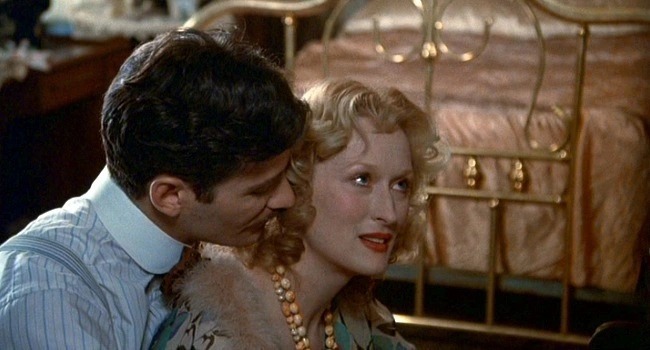Sophie’s Choice (1982)

Sophie’s Choice is a 1982 psychological drama film directed by Alan J. Pakula and based on the 1979 novel by William Styron. The film tells the devastating story of Sophie Zawistowska, a Polish immigrant and Holocaust survivor, who carries a tragic secret from her past. With a powerful performance by Meryl Streep and a poignant exploration of trauma, love, and memory, Sophie’s Choice remains one of the most intense and emotionally charged films of the 1980s.
The plot of Sophie’s Choice revolves around the life of Sophie Zawistowska, portrayed by Meryl Streep, who lives in Brooklyn in the post-World War II years. Sophie, a deeply scarred woman, forms a complex relationship with two men: the narrator, Stingo, a young writer, and Nathan, a charismatic but mentally unstable man. As their relationships unfold, Sophie’s troubled past is gradually revealed, culminating in the film’s infamous and heart-wrenching “choice,” which is at the core of the narrative.
The central theme of Sophie’s Choice is the deep psychological trauma that Sophie endures as a result of her experiences during the Holocaust. The film slowly reveals Sophie’s horrific past, where she was forced to make an unimaginable decision while in a Nazi concentration camp: which of her two children would be spared from the gas chamber. This traumatic event shapes Sophie’s life, leaving her with an overwhelming sense of guilt and self-loathing that she cannot escape. The trauma of this choice haunts her throughout the film, affecting her relationships and her ability to find peace.
Meryl Streep’s performance in Sophie’s Choice is widely regarded as one of the finest in her career. She brings an incredible depth of emotion and vulnerability to her portrayal of Sophie, capturing both her strength and fragility. Streep’s ability to convey the internal conflict and emotional pain of Sophie is astounding, making the character both heartbreaking and unforgettable. Her nuanced performance earned her numerous accolades, including an Academy Award for Best Actress, solidifying her place as one of the greatest actresses of her generation.

The film also explores the complex relationship between Sophie and Nathan, played by Kevin Kline. Nathan is an intense, charismatic figure who is prone to violent mood swings, and his relationship with Sophie is marked by both passion and instability. Nathan’s manic personality and his love for Sophie provide a striking contrast to her own emotional turmoil, and their tumultuous relationship highlights the difficulty of Sophie’s attempt to heal from her past trauma. Kline’s performance as Nathan adds a layer of unpredictability and tension to the film, making the dynamic between the characters even more emotionally charged.

The cinematography and direction of Sophie’s Choice are equally remarkable. Alan J. Pakula’s sensitive handling of the material allows the film to balance the intense emotional moments with quieter, more intimate scenes. The film’s pacing builds steadily, revealing Sophie’s past in layers, with the final revelation being both devastating and inevitable. The visual composition of the film often reflects Sophie’s inner turmoil, with shots that convey a sense of isolation and emotional fragmentation. Pakula’s direction ensures that the audience is fully immersed in Sophie’s emotional journey.

Another important aspect of Sophie’s Choice is its portrayal of memory and survival. The film examines how individuals cope with trauma and the ways in which painful memories can shape one’s identity. Sophie’s choice, which serves as the film’s central tragedy, is not only a literal event but also a symbol of the emotional weight that survivors carry. Through Sophie’s story, the film explores the difficulty of moving forward in life when the past is always present, and how the scars of trauma can never fully heal. It is a poignant commentary on the lasting impact of war and the Holocaust.
In conclusion, Sophie’s Choice is a profoundly moving and thought-provoking film that explores themes of love, guilt, survival, and the trauma of the Holocaust. Meryl Streep’s unforgettable performance, combined with the film’s powerful direction and complex narrative, makes it a haunting exploration of the human condition. It is a film that leaves a lasting impact on viewers, forcing them to confront the depths of human suffering, the complexities of memory, and the difficult choices that shape our lives.











